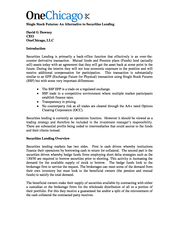Description
How Futures Can Simplify Securities Lending
Page 3 of 3
If Alpha is buying the EFP, someone else, say Hedge Fund Beta, can sell the EFP. Beta does the exact opposite trade,
buying DHI and selling the November SSF. Beta can hold this position as an EFP margined at 5% of the CMV of the
more expensive leg, exit the trade as an EFP, buy the short November SSF back as a separate trade and retain DHI
shares or sell DHI shares and retain the short November SSF.
If Beta chooses the last alternative, selling the shares from the short EFP position and retaining the short November SSF,
Beta must either deliver the shares at expiration or close the short November future by expiration. The short November
SSF can be rolled forward into a short December SSF.
The end result is Alpha retains all of the exposure to DHI during the period when the November or any subsequent SSF is
open as a long position and can make more efficient use of its capital.
The funds tied up in the stock and not earning interest represent an opportunity cost of capital that can be compared to the cost of financing a long SSF position at 20% margin using Treasury bills as collateral. Beta now has a short EFP position which can be held as such, closed as such, or split into either a long DHI stock or a short DHI SSF at its discretion. The purpose of a market is to facilitate trade. We know institutional demand to lend securities is high, as these institutions have participated in these programs for years, and we know trader demand to borrow shares for all manner of purposes is high.
If the standard securities lending markets have been disrupted, why not go to a market where the same trade can be executed with all of the advantages of central clearing and transparent pricing? Howard L. Simons is president of Simons Research, a strategist for Bianco Research, a trading consultant and the author of The Dynamic Option Selection System. Under no circumstances does the information in this column represent a recommendation to buy or sell securities.
While Simons cannot provide investment advice or recommendations, he appreciates your feedback; click here to send him an email. TheStreet.com has a revenue-sharing relationship with Trader's Library under which it receives a portion of the revenue from purchases by customers directed there from TheStreet.com. http://www.thestreet.com/p/pf/rmoney/marketcommentary/10445743.html 1/2/2009 .
The funds tied up in the stock and not earning interest represent an opportunity cost of capital that can be compared to the cost of financing a long SSF position at 20% margin using Treasury bills as collateral. Beta now has a short EFP position which can be held as such, closed as such, or split into either a long DHI stock or a short DHI SSF at its discretion. The purpose of a market is to facilitate trade. We know institutional demand to lend securities is high, as these institutions have participated in these programs for years, and we know trader demand to borrow shares for all manner of purposes is high.
If the standard securities lending markets have been disrupted, why not go to a market where the same trade can be executed with all of the advantages of central clearing and transparent pricing? Howard L. Simons is president of Simons Research, a strategist for Bianco Research, a trading consultant and the author of The Dynamic Option Selection System. Under no circumstances does the information in this column represent a recommendation to buy or sell securities.
While Simons cannot provide investment advice or recommendations, he appreciates your feedback; click here to send him an email. TheStreet.com has a revenue-sharing relationship with Trader's Library under which it receives a portion of the revenue from purchases by customers directed there from TheStreet.com. http://www.thestreet.com/p/pf/rmoney/marketcommentary/10445743.html 1/2/2009 .









